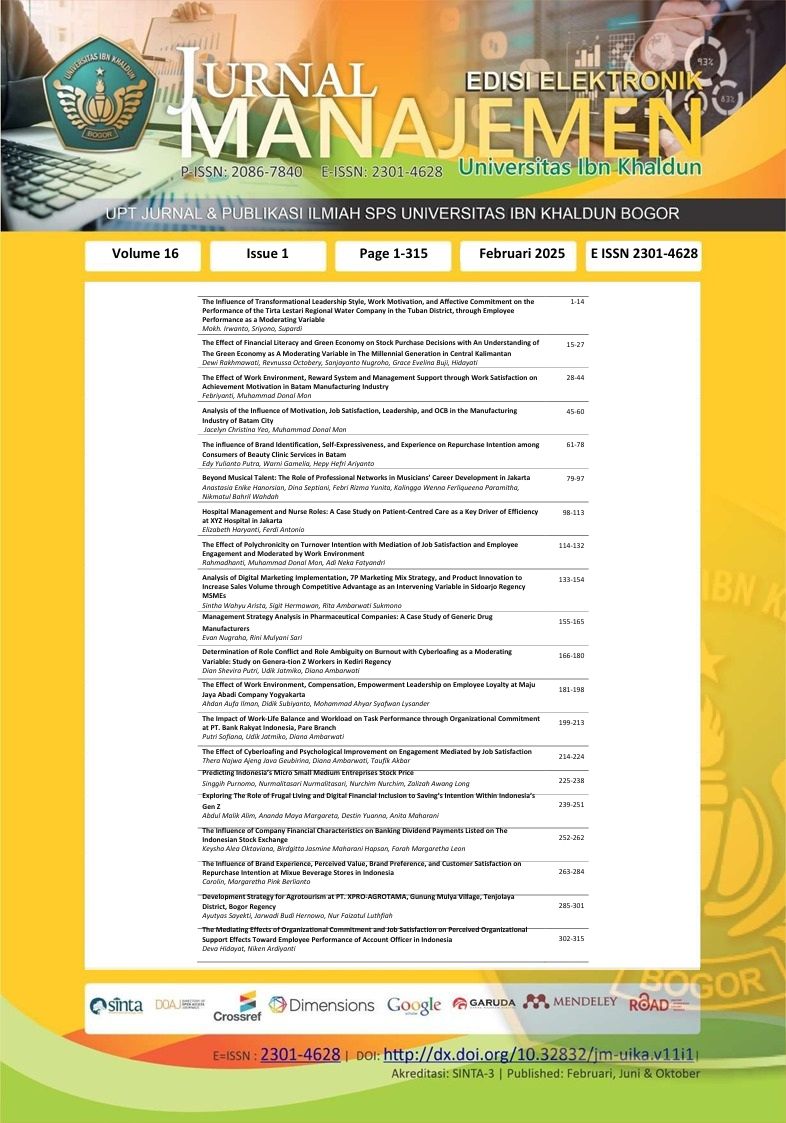The Influence of Transformational Leadership Style, Work Motivation, and Affective Commitment on the Performance of the Tirta Lestari Regional Water Company in the Tuban District, through Employee Performance as a Moderating Variable
DOI:
https://doi.org/10.32832/jm-uika.v15i3.16757Keywords:
Transformational Leadership Style, Work Motivation, Affective Commitment, and Employee PerformanceAbstract
Perusahaan Umum Daerah Air Minum Tirta Lestari a Regional-Owned Enterprise tasked with providing clean water to the com-munity of Tuban Regency, has experienced performance stagnation over the past five years (2019-2023), although overall its performance is still considered good. This study aims to determine the influence of transformational leadership style, work motivation, and affective commitment of employees on the performance of the Regional Drinking Water Company Tirta Lestari in Tuban Regency. This research is a causal study aimed at exploring the influence of independent variables on dependent variables and their impact on the performance of the Regional Drinking Water Com-pany Tirta Lestari in Tuban Regency. Data analysis techniques used include validity testing, reliability testing, and hypothesis testing using a saturated sample of all 114 employees of the company
References
Andelan, R. (2021). Pengaruh Komitmen Afektif, Komitmen Berkelanjutan Dan Komitmen Nor-matif Sebagai Penyusun Dimensi Komitmen Organisasional Terhadap Organizational Citizenship Behavior (OCB) Pada Karyawan PT. Perkebunan Nusantara X. Jurnal Ilmiah Mahasiswa FEB Uni-versitas Brawijaya, 9(2).
Armiyanti, A., Sutrisna, T., Yulianti, L., Lova, N. R., & Komara, E. (2023). Kepemimpinan Trans-formasional Dalam Meningkatkan Kinerja Layanan Pendidikan. Jurnal Educatio FKIP UNMA, 9(2), 1061–1070. https://doi.org/10.31949/educatio.v9i2.5104
Chin, W. W. (2010). How to Write Up and Report PLS Analyses. Handbook of Partial Least Squares, 655–690. https://doi.org/10.1007/978-3-540-32827-8_29
Goni, G. H., Manoppo, W. S., & Rogahang, J. J. (2021). Pengaruh Motivasi Kerja terhadap Pening-katan Kinerja Karyawan pada PT. Bank Rakyat Indonesia Cabang Tahuna. Jurnal Productivity, 2(4).
Hair, J. F., Risher, J. J., Sarstedt, M., & Ringle, C. M. (2019). When to use and how to report the results of PLS-SEM. European Business Review, 31(1), 2–24. https://doi.org/10.1108/EBR-11-2018-0203
Idrus, S., Ruhana, F., Amalia, M. R., Rosyid, A. F., & Kuswandi, D. (2023). Implementasi Ke-bijakan Manajemen Sumber Daya Manusia Yang Efektif Dalam Meningkatkan Kinerja Organisasi Di Era Bisnis Global. Jurnal Ilmiah Manajemen, Ekonomi, & Akuntansi (MEA), 7(1), 72–89. https://doi.org/10.31955/mea.v7i1.2879
Kurniati, N., & Rojuaniah, R. (2023). Pengaruh Kepemimpinan Transformasional, Integritas Per-ilaku Dan Budaya Organisasi Terhadap Kinerja Karyawan. SINOMIKA Journal: Publikasi Ilmiah Bi-dang Ekonomi Dan Akuntansi, 1(5), 1153–1172. https://doi.org/10.54443/sinomika.v1i5.591
Lesmana, M. S., Kirana, K. C., & Subiyanto, E. D. (2023). Pengaruh Budaya Organisasi, Komitmen dan Motivasi Kerja terhadap Kinerja Karyawan: Al-Kharaj : Jurnal Ekonomi, Keuangan & Bisnis Sya-riah, 5(5), 2554–2571. https://doi.org/10.47467/alkharaj.v5i5.3540
Mansor, Z. D., Mun, C. P., Farhana, B. N., Tarmizi, W. A. N., Laoye, A. D., Productivity, E., Style, L., Jannati, Lubis, A. R., Putra, T. R. I., Nawaz, A., Ahsan, A., Haiwei, D., & Guang, R. T. (2017). Leadership on Performance vs. Mediating Effect on Job Satisfaction: Evidence From Higher Educa-tional Institutions in Pakistan. Journal of Higher Education Theory and Practice, 24(1), 146–164. https://doi.org/10.37502/ijsmr.2022.5313
Manurung, W., Bastian, A., & Wardi, J. (2022). Pengaruh Kepemimpinan Transformasional dan Komitmen Afektif Terhadap Kinerja Pegawai Dengan Efikasi Diri Sebagai Variabel Mediasi Pada Dinas Kesehatan Kabupaten Siak. JMBT: Jurnal Manajemen & Bisnis Terapan, 4(2).
Mengko, K. P., Dotulong, L., & Lumintang, G. (2023). Pengaruh kualitas kehidupan kerja dan mo-tivasi terhadap terhadap kinerja karyawan dengan kepuasan kerja sebagai variabel intervening pada hotel swiss bell maleosan manado. Jurnal EMBA: Jurnal Riset Ekonomi, Manajemen, Bisnis Dan Akuntansi, 11(1). https://doi.org/https://doi.org/10.35794/emba.v11i1.45300
Mukrodi, M. (2021). Konsepsi Motivasi Kerja Dalam Upaya Meningkatkan Kinerja Karyawan. Scien-tific Journal Of Reflection : Economic, Accounting, Management and Business, 4(1), 11–20. https://doi.org/10.37481/sjr.v4i1.243
Nugraha, M. I., Utha, A., & Sartono. (2020). Pengaruh Motivasi Dan Lingkungan Kerja Terhadap Kinerja Karyawan Hotel Same Boutique Kendari. Business UHO: Jurnal Administrasi Bisnis, 5(2).
Permadi, I. K. O., & Rasminingsih, N. K. N. (2023). Peran Motivasi Kerja Dalam Memoderasi Hub-ungan Antara Kepemimpinan Terhadap Semangat Kerja Karyawan. Jurnal Maneksi, 12(4), 738–743. https://doi.org/10.31959/jm.v12i4.1896
Sazly, S., & Ardiani, Y. (2019). Pengaruh Kepemimpinan Transformasional terhadap Kinerja Pega-wai pada Kantor Kecamatan Cengkareng Jakarta Barat. Perspektif: Jurnal Ekonomi Dan Manajemen Akademi Bina Sarana Informatika, 17(2). https://doi.org/https://doi.org/10.31294/jp.v17i2.6230
Sekaran, U., & Bougie, R. (2016). Research Methods for Business. John Wiley & Sons.
Sholeh, M. S., & Nugroho, A. S. (2023). Analisis Pengaruh Kualitas Kehidupan Kerja Terhadap Kinerja Karyawan Pada Hotel Flory. Jurnal Bina Manajemen, 12(1), 596–620. https://doi.org/10.52859/jbm.v12i1.508
Sugiyono. (2019). Metode Penelitian Kuantitatif, Kualitatif, dan R&D. Bandung: CV. Alfabeta.
Downloads
Published
How to Cite
Issue
Section
License
Copyright (c) 2024 Jurnal Manajemen (Edisi Elektronik)

This work is licensed under a Creative Commons Attribution-NonCommercial 4.0 International License.
Authors who publish with this journal agree to the following terms:
- Authors retain copyright and grant the journal right of first publication with the work simultaneously licensed under a Creative Commons Attribution-NonCommercial-ShareAlike 4.0 International License that allows others to share the work with an acknowledgement of the work's authorship and initial publication in this journal.
- Authors can enter into separate, additional contractual arrangements for the non-exclusive distribution of the journal's published version of the work (e.g., post it to an institutional repository or publish it in a book), with an acknowledgement of its initial publication in this journal.
- Authors are permitted and encouraged to post their work online (e.g., in institutional repositories or on their website) prior to and during the submission process, as it can lead to productive exchanges, as well as earlier and greater citation of published work (See The Effect of Open Access).











